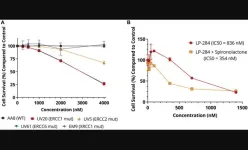(Press-News.org) Gentle cleansers are just as effective in killing viruses – including coronavirus – as harsh soaps, according to a new study from scientists at the University of Sheffield
Healthcare professionals often substitute alcohol-based hand sanitisers and harsh soaps for skin-friendly cleansers in order to treat or prevent irritant contact dermatitis, which develops when chemical or physical agents damage the skin surface faster than the skin can repair
Incidence and severity of irritant contact dermatitis increased from 20 per cent to 80 per cent amongst healthcare professionals during the Covid-19 pandemic
Researchers also found non-enveloped viruses such as norovirus were resistant to all hand wash products tested, and were only killed with bleach disinfectants, which aren’t a feasible option for washing hands
Gentle cleansers are just as effective in killing viruses – including coronavirus – as harsh soaps, a new study by University of Sheffield experts has found.
Health care professionals often substitute harsh soaps or alcohol-based hand sanitisers with skin-friendly cleansers in order to treat or prevent irritant contact dermatitis - a common skin disease which causes red and swollen skin with a dry and damaged surface.
During the Covid-19 pandemic, incidence and severity of the disease amongst healthcare professionals increased from 20 per cent to 80 per cent.
Despite the widespread use of gentle cleansing products for handwashing, there has been limited evidence to show the antiviral efficacy of the products to prevent the spread of viruses such as human coronavirus, herpes simplex virus, norovirus and influenza.
Scientists from the University of Sheffield’s Sheffield Dermatology Research (SDR) group tested multiple handwash products as part of the study. These included antibacterial soap, natural soap, foam cleansers and bath wash products, with the team investigating their ability to kill both enveloped viruses; such as human coronavirus and influenza, which have an additional layer of structural protection; compared to non-enveloped viruses, such as norovirus and adenovirus.
The findings, published in the journal Frontiers in Virology, show gentle cleansers were effective in killing enveloped viruses, but non-enveloped viruses displayed resistance against skin-friendly cleansers, as well as harsh soaps.
Lead author of the study, Dr Munitta Muthana from the University of Sheffield’s Department of Oncology and Metabolism, said: “Washing our hands with soap and warm water for 20 seconds was a fundamental message advocated in the UK to help stop the spread of Covid-19. But for healthcare professionals, who can wash their hands as many as 100 times during a 12 hour shift, this may cause unintended adverse effects.
“Not only does irritant contact dermatitis cause the skin to become inflamed, blister and crack, which increases transmission of bacteria and viruses, it can also lead to less compliance with personal protective equipment (PPE) and inadequate hand washing for fear of making symptoms worse. The disease can also significantly impact workplace productivity.
“For the first time, our study has shown substituting harsh soaps with milder wash products such as gentle cleansers is effective in fighting against enveloped viruses, including human coronavirus, which is very encouraging - especially for those in jobs in which irritant contact dermatitis is an occupational hazard. We also found that using additional agents such as moisturisers to help protect the skin didn’t prevent the products' antiviral activity, which means we don’t have to use very harsh products on our skin in order to kill viruses. ”
Importantly, the study also found non-enveloped viruses demonstrated greater resistance across all types of hand washing products tested, including harsh chemical substances and milder solutions. Norovirus - known as the winter vomiting bug - was the most resilient.
First author of the study, Natalie Winder, PhD Researcher at the University of Sheffield’s Department of Oncology and Metabolism, said: “Even when we increased the exposure of norovirus to the handwashing products from 20 seconds to one minute, the virus wasn’t disrupted. Bleach was the only agent which affected the virus - however bleach-based hand washes are not a feasible option due to its corrosivity, which would be extremely harmful to the skin.
“Norovirus can spread very easily - it takes just 18 norovirus particles to infect another person, as opposed to 1,000 coronavirus particles needed to spread the infection. Our findings show that although good hand hygiene practices are important to preventing the spread of many viruses, they are insufficient at controlling the norovirus.
“Measures such as isolation and disinfecting surfaces with bleach are more effective in preventing the spread of the norovirus infection and more research needs to be done to see whether heavily diluted bleach-based hand washes, which are safe to use on the skin, can be produced.”
The study was conducted by the University of Sheffield and funded by CeraVe.
View the paper in full
For more information please contact: Amy Huxtable, Media Team, University of Sheffield, a.l.huxtable@sheffield.ac.uk
END
Gentle cleansers kill viruses as effectively as harsh soaps, study finds
Healthcare professionals often substitute alcohol-based hand sanitisers and harsh soaps for skin-friendly cleansers in order to treat or prevent irritant contact dermatitis
2023-06-13
ELSE PRESS RELEASES FROM THIS DATE:
LP-284 targets non-Hodgkin's lymphoma and DNA damage repair deficiency
2023-06-12
“[...] we demonstrated the new acylfulvene compound LP-284 has anti-tumor activity including nanomolar potency in fifteen in vitro NHL cell lines and in vivo preclinical NHL models.”
BUFFALO, NY- June 12, 2023 – A new research paper was published in Oncotarget's Volume 14 on June 12, 2023, entitled, “LP-284, a small molecule acylfulvene, exerts potent antitumor activity in preclinical non-Hodgkin's lymphoma models and in cells deficient in DNA damage repair.”
Despite advances in therapies treating non-Hodgkin’s ...
Damon Runyon Cancer Research Foundation announces three recipients of 2023 Physician-Scientist Training Award
2023-06-12
Three scientists with exceptional promise and novel approaches to fighting cancer have been named the 2023 recipients of the Damon Runyon Physician-Scientist Training Award. The awardees were selected through a highly competitive and rigorous process by a scientific committee comprised of leading cancer researchers who are themselves physician-scientists.
Physician-scientists are uniquely positioned to translate scientific discoveries into therapies that improve and prolong the lives of their patients. However, ...
Where there’s smoke are lessons in demands of global sustainability
2023-06-12
As the world struggles for sustainability in the face of climate change, wildfire smoke becomes a lesson in how people can become victims far from the root of a problem and far from their control.
In this month’s open access National Science Review, Jianguo “Jack” Liu, MSU Rachel Carson Chair in Sustainability, makes a case for the world to shake off the constraints of traditional governance, which tends to address issues in one place without considering how people or ecologies near and far might be impacted.
Justice at a global scale can be threatened when natural events or human decisions in one part of the world to protect, reroute, ...
Dartmouth-led project updates smoking as a risk factor in NCI mortality estimates
2023-06-12
New findings from a project led by researchers at Dartmouth’s Geisel School of Medicine in collaboration with the National Cancer Institute (NCI) and published in the journal JAMA Network Open, show the dramatic impact that smoking status has on mortality and more accurately predict the risk of dying from cancer and other diseases.
“Historically, mortality risk has often been presented by age, sex, and race but it rarely has accounted for smoking status—a major risk factor for many causes of death,” says lead author Steven Woloshin, MD, MS, a professor of ...
Victor J. Torres, Ph.D., named chair of newly formed Department of Host-Microbe Interactions at St. Jude Children’s Research Hospital
2023-06-12
(MEMPHIS, Tenn., June 12, 2023) St. Jude Children’s Research Hospital today announced that Victor J. Torres, Ph.D., an internationally renowned microbiologist and immunologist has been selected as the inaugural chair of a new Department of Host-Microbe Interactions. This department will establish a world-leading effort focused on exploring the fundamental biology of the interaction of infectious agendas with the human host. The discoveries made through this new effort will advance our ability to more effectively treat, as well as prevent infectious diseases
“Infectious diseases remain one of the leading causes of death globally for children under the age of five,” ...
Digital divide hinders rural innovation, study shows
2023-06-12
UNIVERSITY PARK, Pa. — Cloud-based computing directly contributes to business innovation, but rural businesses lacking sufficient broadband capacity to access cloud services are missing out on their innovation-boosting potential, according to a team of researchers from Penn State and the National Science Foundation. The findings can be used by policymakers and business-support organizations to foster greater opportunities for rural innovation.
“Innovation plays a critical role in keeping businesses competitive and viable, and in turn, healthy businesses are essential to vibrant rural economies. Therefore, we’re interested ...
Penile HIV infection is effectively prevented by antiretroviral treatment
2023-06-12
Of the 38 million people worldwide living with HIV, approximately 700,000 are newly infected men, primarily via sexual transmission. Sexually transmitted HIV infections in exclusively heterosexual men are acquired through the penis. In addition, semen which is produced in the male genital tract (MGT) has been recognized as the primary vector for vaginal and rectal HIV transmission. Notably, the risk of sexual HIV transmission increases with the presence of a concurrent sexually transmitted infection.
For the majority of patients, antiretroviral therapy (ART) rapidly decreases the viral load in blood and semen, ...
Breakthrough in glioblastoma treatment with the help of a virus
2023-06-12
In a recently published manuscript, Howard Colman, MD, PhD, Jon M. Huntsman Presidential Professor of Neuro-Oncology and co-leader of the Neurologic Cancers Disease Center and the Experimental Therapeutics CCSG program at Huntsman Cancer Institute, identified a potential breakthrough in glioblastoma treatment.
Glioblastoma, or GBM, is an aggressive type of brain cancer. According to Colman, this is the most common type of cancerous brain tumor in adults. Standard treatments include radiation and chemotherapy. Unfortunately, typical GBM tumors are often resistant ...
AMA strengthens its policy on protecting access to gender-affirming care
2023-06-12
CHICAGO—The American Medical Association (AMA) House of Delegates today passed the Endocrine Society’s resolution to protect access to evidence-based gender-affirming care for transgender and gender-diverse individuals.
As political attacks on gender-affirming care escalate, it is the responsibility of the medical community to speak out in support of evidence-based care. Medical decisions should be made by patients, their relatives and health care providers, not politicians.
In the resolution, the AMA committed to opposing any criminal and legal penalties against patients seeking ...
Even with insurance, many patients with diabetes turn to GoFundMe to offset high cost of care
2023-06-12
Abstract: https://www.acpjournals.org/doi/10.7326/M23-0540
URL goes live when the embargo lifts
An analysis of medical crowdfunding campaigns reveals the types of expenses that patients with diabetes may struggle to afford. The data showed that even insured patients with diabetes used GoFundMe to offset the excess costs of treatment beyond insulin, such as uncovered co-pays, indirect care, and alert dogs. The findings are published in Annals of Internal Medicine.
More than 40% of patients with diabetes in the United States have trouble ...
LAST 30 PRESS RELEASES:
Differing immune responses in infants may explain increased severity of RSV over SARS-CoV-2
The invisible hand of climate change: How extreme heat dictates who is born
Surprising culprit leads to chronic rejection of transplanted lungs, hearts
Study explains how ketogenic diets prevent seizures
New approach to qualifying nuclear reactor components rolling out this year
U.S. medical care is improving, but cost and health differ depending on disease
AI challenges lithography and provides solutions
Can AI make society less selfish?
UC Irvine researchers expose critical security vulnerability in autonomous drones
Changes in smoking status and their associations with risk of Parkinson’s, death
In football players with repeated head impacts, inflammation related to brain changes
Being an early bird, getting more physical activity linked to lower risk of ALS
The Lancet: Single daily pill shows promise as replacement for complex, multi-tablet HIV treatment regimens
Single daily pill shows promise as replacement for complex, multi-tablet HIV treatment regimens
Black Americans face increasingly higher risk of gun homicide death than White Americans
Flagging claims about cancer treatment on social media as potentially false might help reduce spreading of misinformation, per online experiment with 1,051 US adults
Yawns in healthy fetuses might indicate mild distress
Conservation agriculture, including no-dig, crop-rotation and mulching methods, reduces water runoff and soil loss and boosts crop yield by as much as 122%, in Ethiopian trial
Tropical flowers are blooming weeks later than they used to through climate change
Risk of whale entanglement in fishing gear tied to size of cool-water habitat
Climate change could fragment habitat for monarch butterflies, disrupting mass migration
Neurosurgeons are really good at removing brain tumors, and they’re about to get even better
Almost 1-in-3 American adolescents has diabetes or prediabetes, with waist-to-height ratio the strongest independent predictor of prediabetes/diabetes, reveals survey of 1,998 adolescents (10-19 years
Researchers sharpen understanding of how the body responds to energy demands from exercise
New “lock-and-key” chemistry
Benzodiazepine use declines across the U.S., led by reductions in older adults
How recycled sewage could make the moon or Mars suitable for growing crops
Don’t Panic: ‘Humanity’s Last Exam’ has begun
A robust new telecom qubit in silicon
Vertebrate paleontology has a numbers problem. Computer vision can help
[Press-News.org] Gentle cleansers kill viruses as effectively as harsh soaps, study findsHealthcare professionals often substitute alcohol-based hand sanitisers and harsh soaps for skin-friendly cleansers in order to treat or prevent irritant contact dermatitis


